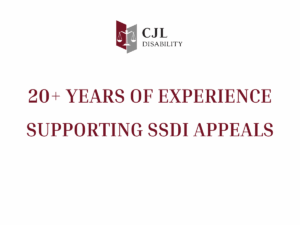Learn the SSA definition of disability, how the Social Security Administration evaluates claims, and what you need to know to qualify for benefits.
The SSA definition of disability is much stricter than many people expect. To qualify, you must show more than the fact that you can no longer do your old job. The Social Security Administration (SSA) requires proof that your condition keeps you from performing any substantial work and that it meets both medical and duration requirements.
How SSA Defines a Disability
Unlike some private insurance programs, the SSA does not recognize partial or short-term disabilities as qualifying conditions. Instead, applicants must meet very specific legal and medical standards.
The SSA’s definition of a disability requires:
- A medically determinable physical or mental impairment, supported by clinical or laboratory evidence.
- An impairment that prevents you from engaging in Substantial Gainful Activity (SGA), meaning you cannot earn above a certain monthly income.
- A condition that is expected to last at least 12 months or result in death.
Key Components of Meeting the SSA’s Definition of Disability
Many people are denied benefits because they do not fully understand what the SSA requires. Meeting the SSA’s definition of disability involves proving not only that you are limited, but that you are unable to work in any meaningful capacity.
The SSA evaluates:
- Objective medical evidence, including test results or imaging, not just personal testimony
- Whether your condition is severe enough to limit work activities significantly
- Your ability to perform any job, even one that is different from what you have done before
- The duration of your condition, which must last at least a year or be terminal
What is the SSA Definition of Disability in Practice?
The SSA applies its standards using a five-step evaluation. This process determines whether your condition qualifies for benefits.
The five steps include:
- Work Activity – Are you currently earning more than the SGA limit?
- Severity – Does your condition prevent you from performing basic work-related functions?
- Listings – Is your condition listed in the SSA’s “Blue Book” of impairments?
- Past Work – Can you still do any of your previous jobs?
- Other Work – Could you reasonably perform another type of work given your age, education, and skills?
How Culbertson, Jacobs & LaBoda Can Help
Proving that you meet the SSA’s definition of a disability is not easy. Most applicants are denied at least once, often because they did not submit enough medical evidence or because their claim did not clearly show how their condition affects daily life.
At Culbertson, Jacobs & LaBoda, our attorneys provide:
- Case Reviews – We analyze your denial or pending claim to identify weaknesses.
- Evidence Gathering – We work with doctors and specialists to collect the medical proof the SSA requires.
- Appeals Representation – If your claim is denied, we represent you at every stage, from reconsideration to federal court.
- Preparation for Hearings – We guide you through testimony and ensure you are ready for questions from an Administrative Law Judge.
- Client-Focused Support – We explain each step clearly so you always know what to expect.
When to Call an Attorney for Help
You should reach out to an attorney as soon as you receive a denial letter, but you do not need to wait for a denial to get help. Our team can assist from the very beginning of the claims process, ensuring your claim is strong and complete from day one.
Legal guidance is especially important if:
- You are applying for the first time and want to avoid mistakes.
- Your initial claim has been denied.
- You are preparing for a disability hearing before an Administrative Law Judge.
- Your medical condition is complex or does not neatly fit into the SSA’s listing of impairments.
Get Help With Your Disability Claim
The process of applying for disability benefits can be overwhelming, but you do not have to face it alone. At Culbertson, Jacobs & LaBoda, we are dedicated to helping clients prove that they meet the SSA definition of disability to pursue the benefits they deserve.
Contact us today to schedule a consultation with one of our experienced Social Security Disability attorneys. We are ready to guide you through every step of the process.

